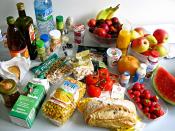Countries have typically linked their national security closely with advanced weapon systems and a large military budget. The key to national security and survival, however, is a reliable food supply. A food supply must be maintained despite such factors as land conversion, population growth and economic inequalities. Reliable food supplies in developing countries are in jeopardy due to deliberate crop destruction and inefficient food distribution; resulting in widespread chronic hunger.
Each year millions of acres of the world's farmland are lost to the spread of cities and suburbs, highway and airport construction and shopping centers. In Canada, most of the land taken over by urban sprawl came from the best cropland. Even in the Third World or developing countries, land conversion is a serious problem; this is because the population increases in such countries are comparatively great and the growing number of people need more land to live on.
Increases in food supply cannot keep up with rapid increases in population. In other words, the world population could outstrip its ability to feed itself.
More than half the world's population lives with hunger and malnutrition everyday in spite of the fact, that most countries are self sufficient in food supply. This situation exists in most of the Third World because the foreign assistance programs used to improve agricultural output, generally go to the wealthier farmers who use it to increase productivity; while cutting labor costs. Due to industrial modernization, such countries require the maintenance of a large, low paid workforce. Therefore farmers are not inclined to invest in agriculture, since it would not profit them and the areas most in need of increased food production are, by national policy, discouraging it.
The attention to equity, to agriculture and to population control has reduced the threat of famine.


